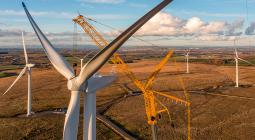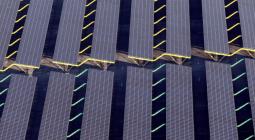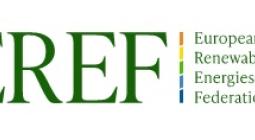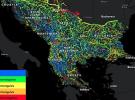EU strikes deal on renewable energy law, agrees 42.5% target by 2030
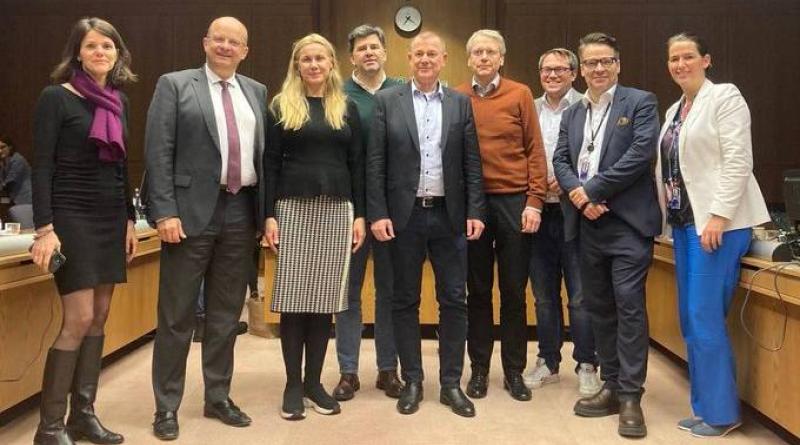
Agreement on the EU’s renewable energy directive brings to a close an 18-month process to upgrade the bloc’s climate policies and achieve a 55% net reduction in greenhouse gas emissions by 2030.
EU legislators reached an agreement on the renewables law at around 07.30 CET on Thursday (30 March) after a long night of negotiations which started at 16.00 the day before.
The political deal reached by the European Parliament, the EU’s executive Commission and EU member states includes a legally-binding target to “raise the share of renewable energy in the EU’s overall energy consumption to 42.5% by 2030,” according to a statement released after the talks.
EU countries that choose to do so can complement this target with “an additional 2.5% indicative top-up that would allow reaching 45%,” the statement adds.
This roughly means doubling the share of renewables in the EU’s energy mix, which currently stand at 22.1%, according to EU statistics.
The revised directive also adds targets for buildings and seeks faster permitting processes for wind and solar projects with the introduction of dedicated “acceleration areas” for renewables.
“I’m glad we made it,” said Markus Pieper, a German conservative lawmaker who led the European Parliament’s delegation in the three-way talks.
“We will not only increase the share of renewables to 42.5% but also substantially fasten authorisation and permit-granting processes for renewable energy facilities. This is a good day for Europe’s energy transition,” Pieper said.
The deal closes negotiations on the main elements of the EU’s ‘Fit for 55’ climate package tabled in July 2021, which seeks to achieve a 55% net reduction in greenhouse gas emissions by 2030.
Before it becomes law, the political deal must still be formally ratified by the EU’s two co-legislators – the European Parliament and the Council of the EU representing the bloc’s 27 member states. This is usually a formality.
Meeting halfway on the 2030 target
EU negotiators were divided over the bloc’s level of ambition on renewables.
After Russia’s invasion of Ukraine last year, the Commission had proposed raising the EU’s 2030 renewable energy objective from 40 to 45%, a position that Parliament overwhelmingly supported in a September vote.
Speeding up the deployment of renewables is “a key component of our agenda to phase out Russian fossil fuels” and isolate Moscow, the EU’s energy commissioner Kadri Simson told the bloc’s 27 energy ministers in December.
But EU member states were unconvinced and could only find a majority to support the 40% target tabled by Brussels the year before.
Backed by other central and east European countries, Poland called on the EU to stick with the 40% target. But others like Denmark, Germany, and Spain supported the 45% target and brought eight EU countries on board.
In the end, they met halfway – at 42.5%.
Recognition for nuclear
A dispute over the role of nuclear energy in meeting the bloc’s decarbonisation goals threatened to derail the negotiations ahead of Wednesday’s talks.
Hours before they met, EU countries were still at odds over whether to recognise hydrogen produced from low-carbon nuclear power under the bloc’s renewable fuel targets for transport and industry.
France, backed by at least eight other EU countries, was leading a push for “low-carbon hydrogen” to be deducted from the bloc’s renewable goals, a move staunchly resisted by a rival group of at least nine other EU countries, including Germany.
In the end, the provisional agreement gives member states the possibility to choose between two objectives when it comes to renewable transport fuels, the statement said:
- a binding target of 14.5% reduction of greenhouse gas intensity in transport from the use of renewables by 2030;
- or a binding target of at least 29% share of renewables within the final consumption of energy in the transport sector by 2030.
The greenhouse gas intensity goal is a concession to countries like France, which already has a low-carbon electricity mix thanks to its fleet of 56 nuclear reactors.
According to Canfin, the political deal “recognises the specific role of nuclear power, which is neither green nor a fossil fuel”.
For industry, the political deal introduces an objective to increase the use of renewable energy by 1.6% every year by 2030. This is an “indicative” target however, meaning that it is not a legally-binding obligation.
In addition, 42% of industry’s use of hydrogen should come from renewable fuels by 2030 and 60% by 2035, the EU statement says, with possible derogations foreseen for countries that already meet their decarbonisation goals – another win for France and its low-carbon electricity mix. These are legally-binding goals.
Reactions
Environmental groups expressed disappointment with the deal, saying the 42.5% target is insufficient to avoid climate breakdown and move to a 100% renewable energy mix.
“Policymakers have fallen short on ambition,” said Climate Action Network Europe, a coalition of over 170 non-governmental organisations pushing for stronger climate action.
“Year on year, the urgency in transitioning to a fully renewable energy system becomes greater, yet, this is not reflected in the commitments and ambitions levels of EU policymakers and Member States,” said Veerle Dossche, energy policy coordinator at CAN Europe.
“Now all eyes will be on Member States to raise the bar and not only aim for 45% but also exceed it with commitment and delivery on the ground,” she added in a statement.
SolarPower Europe, an industry group, took a more pragmatic stance about the 42.5% target, saying this “was the only deal possible” given the reluctance of some EU member states.
Still, the solar industry remained upbeat and urged EU countries to raise the bar to 45%. “We’re celebrating that the EU has set a path to at least 45% renewables this decade,” said Walburga Hemetsberger, CEO of SolarPower Europe. “As for the indicative 2.5% target, the task now is to use the EU tools at hand to secure the top up,” she added.
Fern, a campaign group lobbying for the protection of forests, said EU lawmakers have done too little to curb incentives for biomass, which they say drives deforestation in Europe and harms biodiversity.
“Because it will keep rewarding energy companies burning millions of trees, our main land carbon sink, the RED will continue to worsen the climate and biodiversity crisis, harm people’s health, and actively undermine the EU’s climate ambitions,” said Martin Pigeon, a campaigner at Fern.
The European Parliament initially sought to end subsidies for biomass and exclude primary wood burning from the EU’s renewable energy targets but the move was resisted by countries like Finland and Sweden, which rely on biomass for a significant share of their energy.
cover photo: EU negotiators were at odds over the bloc’s level of ambition on renewables, with the European Commission and Parliament pushing for a 45% target by 2030 and member states supporting a 40% objective. In the end, they met halfway. [Christophe GRUDLER / Twitter]


